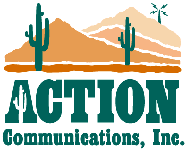Call to
Action
800-214-6011
520-792-0326
Authorized
Motorola
Radius
Full Line
Professional series
ICOM
Vertex/Standard
Kenwood
(Arizona)
Uniden
Bendix/King
Relm
Zetron
SCA (Shinwa)

Action Communications
Buyers Guide
Unit-to-unit -- Handhelds have a range of about one mile depending on the terrain. Mobile and base station ranges increase to between five and 10 miles depending on terrain. In order to increase these unit-to-unit ranges, users incorporate the use of a local repeater into their system.
Citywide -- To get citywide service, ranges from 10 to 50 miles or more, you would subscribe to a local repeater service.
Repeater -- Repeaters are strategically located in every community to give the greatest coverage possible. Repeaters receive a radio signal and immediately retransmits that signal. Since the repeater has a much higher output power and is usually located at a higher elevation, the repeater is an excellent way to extend the coverage range of a mobile or handheld.
Conventional repeaters are shared by many users. Users must monitor the single frequency before transmitting to avoid interrupting other transmissions in progress.
Trunking repeaters eliminate the need for channel monitoring but do not assign a specific channel to each customer. Other users cannot monitor your calls.
Radios on repeater systems usually have an additional channel that enables them to talk unit-to-unit at short ranges, such as within a warehouse or on a job site without using the repeater.
Mobile -- A radio that is mounted in either the trunk or under the dash of a vehicle.
Portable -- Also known as handheld, a portable is a battery-powered radio that is small enough to be carried by a person.
DTMF -- Dual Tone Multi Frequency is a tone coding system used by phone company. Most two-way radios can be enhanced by a telephone interconnect option. This allows users of mobiles or handhelds to make or receive standard telephone calls over the two-way radio. Phone conversations on radios are conducted in a half-duplex mode, that is, only one party can talk at a time.
Tone -- Also known as coded squelch allows listeners to hear only those messages intended for them. The two most common types of coded squelch are analog tone coded squelch (CTCSS or Private Line - PL) and digital coded squelch (DCS or Digital Private Line - DPL). Squelch refers to circuitry in a radio used to reduce, or eliminate unwanted signals and noise before they are heard in the speaker.
PTT -- Push to talk. User must push a switch to talk, release to listen.
VOX -- Voice activated. User's voice opens the switch to talk.
GPS -- Global positioning system. Uses satellite signals to pinpoint location of the GPS receiver.
Gang charger -- A rapid charger that charges usually up to six radios in one location.
NiCd -- Nickel Cadmium rechargeable battery.
Fixed base -- Equipment located at a central site such as an office usually consisting of a base station, microphone and antenna.
Simplex -- Transmitting in one direction at a time. Radio units are transmitting and receiving on the same frequency.
Talkaround -- Frequency in a radio which allows users to avoid using the repeater especially when they are at the same location within one mile of each other. The frequency allows you to "talk around" the repeater, which is the same as operating on a simplex frequency.
Catalog/Online Store | Request Bid | Profile
Line Card | Rental Program | Links | FAQs
Battery Care | News

Action Communications, Inc.
2816 North Stone Ave.
Tucson, AZ 85705
E-mail: sales@actioncommunications.com
Phone:
1-800-214-6011
520-792-0326
(8 a.m. to 5 p.m. MST)
Fax: 520-792-2709
Don't buy
two-way radios
without a bid from
Action Communications
![]()

![]()
![]()
![]()
![]()
